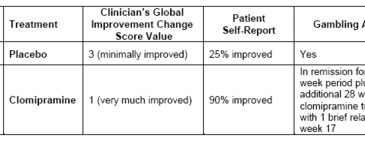Although most treatment approaches for problem gambling primarily involve psychodynamic and behavioral interventions, research also suggests that some patients will benefit from pharmacological intervention. Drug treatments that may benefit patients with pathological gambling disorders include clomipramine1, lithium carbonate2, and carbamazepine3. Large-scale randomized clinical trials have not been conducted to test the efficacy of any of these medications for pathological gambling. However, there have been a few case reports of patients who were using these medications as part of their treatment plan. For example, a woman with a 12-year history of pathological gambling was treated with clomipramine, an antidepressant. The treatment design was a placebo-controlled, double-blind trial. This means that both a placebo and the drug were tested (for ten weeks each) for efficacy; neither the patient nor the treatment provider knew which condition, placebo or drug, was being administered. Clomipramine appeared to be more successful than the placebo in treating pathological gambling behavior. The patient abstained from gambling for the entire experimental medication phase plus an additional 28 weeks of open clomipramine treatment, with one brief relapse at week 17. Although a single case report cannot establish the efficacy of a drug treatment protocol, the results of this case study suggest the need to confirm the efficacy of clomipramine for the treatment of pathological gambling. To confirm the utility of any pharmacotherapy, researchers must initiate placebo-controlled, double-blind clinical trials with larger patient samples.
Sources:
Hollander, E., Frenkel, M., DeCaria, C., Trungold, S., & Stein, D.J. (1992). Treatment of pathological gambling with clomipramine [letter]. American Journal of Psychiatry, 149(5), 710-711
Moskowitz, J.A. (1980). Lithium and lady luck: Use of lithium carbonate in compulsive gambling. New York Journal of Medicine, 80, 785-788; 3Haller, R., & Hinterhuber, H. (1994). Treatment of pathological gambling with carbamazepine. Pharmacopsychiatry, 27, 129.
This public education project is funded, in part, by The Andrews Foundation and the Massachusetts Department of Public Health.
This fax may be copied without permission. Please cite The WAGER as the source.
For more information contact the Massachusetts Council on Compulsive Gambling,
190 High Street, Suite 6, Boston, MA 02110.





